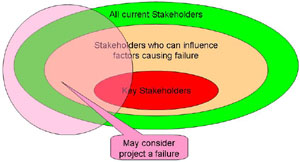I was recently asked by a colleague for the definition of key stakeholder. Everyone writing about stakeholders uses the term probably synonymously with ‘important stakeholder’ but what is the actual definition?
One definition is from Cornell University, Information Technologies. Their definition is: ‘Key Stakeholders are a subset of Stakeholders who, if their support were to be withdrawn, would cause the project to fail’.
This definition is probably true of IT and internal projects but ignores important stakeholder groups such as the ‘environmentalists’ opposed to a major engineering project. Some important stakeholders will never support the project and are focused on preventing it proceeding (or in the example above, at least minimising its impact on the environment). They may never see the project’s output as good or desirable – for these, effective stakeholder management is about finding an effective, ethical way of neutralising the threat they pose.
We use the term key stakeholder to identify members of the sub-group of stakeholders who have the power to substantially damage the project and may potentially cause it to fail. This group are both important and influential/powerful; they may be individuals such as an important manager or entities such as a regulatory authority. This concept of key stakeholder is used extensively in my book Stakeholder Relationship Management: A Maturity Model for Organisational Implementation (due for publication, September 2009).

Key stakeholders must be both important and influential
Our definition is:
Key stakeholders are a subset of stakeholders who have power to prevent the project from achieving its full set of objectives and potentially may cause the project to fail.
This is the flip side of success. Before you can win a game, you have to not lose it. (Chuck Noll, ex-Pittsburgh Steelers Coach). If you fail to manage your project’s key stakeholder community, your project is almost certain to fail: not failing however, does not mean succeeding.
A large proportion of the project’s key stakeholders will also have the power to influence the determination/perception of the project’s eventual success. But in most circumstances, if the project is to be deemed successful, a large numbers of additional stakeholders will have to want to make use the project’s output to realise the value/benefits the project was initiated to create.

For the project to be deemed successful, most stakeholders must perceive it as a success
Achieving success involves significantly more than just completing the project on-time and on-budget. For more on this see my earlier post Success and Stakeholders.
Definitions:
- Organisation’s Stakeholder: Stakeholders are individuals or groups who will be impacted by, or can influence the success or failure of an organisation’s activities.
- Project’s Stakeholder: Stakeholders are individuals or groups who will be impacted by, or can influence the success or failure of the project’s work and/or its deliverables.
- Important Stakeholder: A stakeholder who has been identified as important, using an appropriate prioritisation methodology (such as the Stakeholder Circle®), for the purpose of allocating scarce resources to ensure effective communication and to focus other stakeholder management initiatives.
- Key Stakeholder: A stakeholder who has to power to prevent the project from achieving its full set of objectives and potentially may cause the project to fail.
Note: By these definitions, key stakeholders are always a potential risk to the project (opportunity and/or threat) but may not be particularly important ‘at this point in time’ if the relationship is working well (ie, they may not need high priority communication at this point in time). This will be the subject of a future blog.
Are you aware of any better definitions of key stakeholder? Your comments are welcome.

Is stakeholder intrinsically tied to culture? The current World Bank President Robert Zoellick formerly U.S. deputy secretary of state was in China in 2006 meeting Chinese Premier Wen.
http://www.chinadaily.com.cn/english/doc/2006-01/24/content_515107.htm
“”In September of 2006 in Beijing, US Deputy Secretary of State Robert Zoelick used the word “stakeholder” when speaking about US/China relations . The Chinese language does not have a corollary word for “stakeholder” and the use of the word led to quite a fuss.””
PM World Today – November 2006 (Vol. VIII, Issue 11)
By Robert Youker
The other meanings of Stakeholder; Person holding a stake in a bet, Person holding a Mining Claim seem unrelated in some ways.
Youker also states in his November 2006 Article some of the History of the word used in Project Management.
“Mason and Mitroff in their 1981 book, “Challenging Strategic Planning Assumptions”
posited the following source. “The term “stakeholder” concept seems to have
emerged initially in the systems analysis work on organizations conducted by
researchers at the Tavistock Institute in London. Rhieman, Eric. Industrial
Democracy and Industrial Man (London: Tavistock Institute, 1968) and Fox, Alan. A
Sociology of Work in Industry (London: Coller MacMillan Limited, 1971), pp. 57-68
contain good discussion of the idea and its application to management.”
I believe there is a lot of value in your comments Robert.
Bob Youker has provided some of the resource materials used in my new book Stakeholder Relationship Management: A Maturity Model for Organizational Implementation and I’m familiar with his work.
More recently a paper by SK Khor at the PMI Asia Pacific Congress in Kuala Lumpur discussed Guanxi in the context of project stakeholder management. My assumption at this point is that the importance of managing an activity to satisfy its key stakeholder is important in any culture. The difference and importance of cultural understanding lays in understanding what’s important to success and the way this is best achieved within a cultural context. Certainly in many cultures the concepts of time and the concepts of contract are very different to the Anglo/American culture.
I am addressing some of these issues in a paper to be presented in Amsterdam in May – more on that later.
Lynda